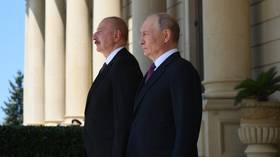Ex-US Treasury Secretary ridicules plan to cap price of Russian oil

Former US Treasury Secretary Steven Mnuchin has criticized the Group of Seven (G7) plan of capping the price of Russian oil in an interview to CNBC.
The measure, which is due to be implemented early next month, is “not only not feasible, I think it’s the most ridiculous idea I’ve ever heard,” Mnuchin said.
The former official said that “the market is going to set the price. So if you put sanctions on at higher prices, in a way you’re just making the situation worse.”
The G7 countries, comprising the US, Canada, UK, Germany, France, Italy, and Japan, earlier agreed to set a fixed price limit on Russian oil. The measure takes effect on December 5. While the price level is not yet known, reports indicate it will be set at around $60 per barrel. The current market price on Brent crude, the global oil benchmark, is around $86 per barrel.
Under the plan, Western companies will be banned from providing certain services for shipments of Russian oil that is purchased at a price above the cap. The list of services includes insurance and facilitating payments. The mechanism, which had been pitched by Washington, is intended to limit Russia’s revenues from energy exports, which, the West claims, Moscow uses to fund its military operation in Ukraine.
Moscow, meanwhile, has increased oil exports in recent months to countries outside of the West, particularly China and India, by offering discounts to secure buyers.
Analysts say that in order for the price cap to have the desired effect, the G7 would have to make sure these countries join the scheme. However, Russian officials have repeatedly stated that the country will not sell oil to buyers that agree to the price cap, which may make many reluctant to participate in the mechanism.
India, for instance, recently said it sees no “moral conflict” in importing Russian oil and will buy it “from wherever” to ensure the country’s energy stability.
For more stories on economy & finance visit RT's business section













